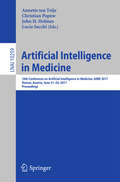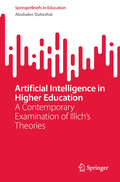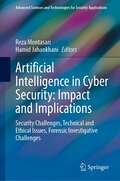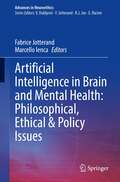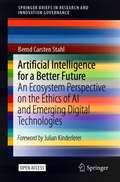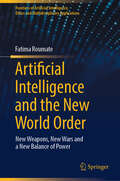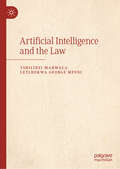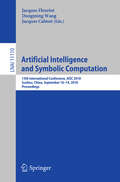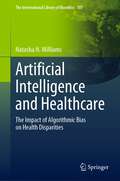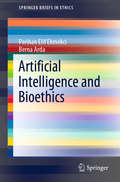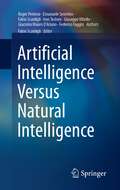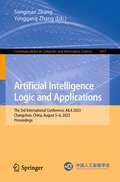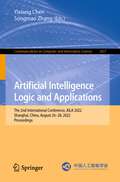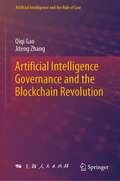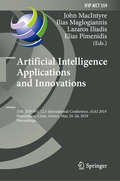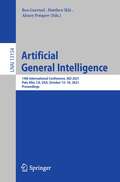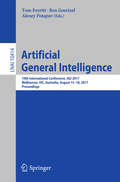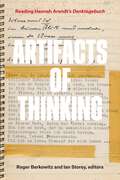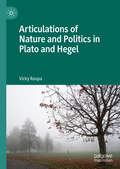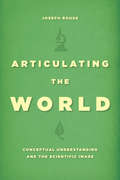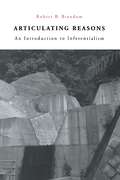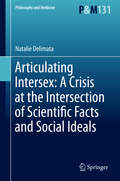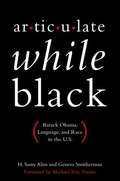- Table View
- List View
Artificial Intelligence in Medicine: 16th Conference on Artificial Intelligence in Medicine, AIME 2017, Vienna, Austria, June 21-24, 2017, Proceedings (Lecture Notes in Computer Science #10259)
by Annette ten Teije, Christian Popow, John H. Holmes and Lucia SacchiThis book constitutes the refereed proceedings of the 16th Conference on Artificial Intelligence in Medicine, AIME 2017, held in Vienna, Austria, in June 2017.The 21 revised full and 23 short papers presented were carefully reviewed and selected from 113 submissions. The papers are organized in the following topical sections: ontologies and knowledge representation; Bayesian methods; temporal methods; natural language processing; health care processes; and machine learning, and a section with demo papers.
Artificial Intelligence in Higher Education: A Contemporary Examination of Illich's Theories (SpringerBriefs in Education)
by Abubaker QutieshatThis book is multi-dimensional exploration of Ivan Illich's critique of institutionalized education. It dissects, analyzes, and understands the implications of his critique for the future of education in a world increasingly influenced by technology, particularly artificial intelligence (AI). The book outlines the problems with current educational systems and discusses potential alternatives, considering the role of modern technology like AI. It employs a multi-disciplinary approach, incorporating historical analysis, philosophical inquiry, and practical considerations to explore Illich's critique. Readers will be equipped with the knowledge to critically assess the educational landscape and consider viable alternatives for reform. This book contributes to the field of educational theory and practice in its nuanced understanding of Illich's critique and its implications for educational reform. It serves as both a theoretical exploration and a practical guide, making it a valuable resource for a wide range of readers, including educators, policymakers, students, and anyone interested in the future of education.
Artificial Intelligence in Cyber Security: Security Challenges, Technical and Ethical Issues, Forensic Investigative Challenges (Advanced Sciences and Technologies for Security Applications)
by Hamid Jahankhani Reza MontasariThe book provides a valuable reference for cyber security experts, digital forensic practitioners and network security professionals. In recent years, AI has gained substantial attention from researchers in both academia and industry, and as a result AI’s capabilities are constantly increasing at an extraordinary pace. AI is considered to be the Fourth Industrial Revolution or at least the next significant technological change after the evolution in mobile and cloud computing technologies. AI is a vehicle for improving the quality of our lives across every spectrum with a broad range of beneficial applications in various sectors. Notwithstanding its numerous beneficial use, AI simultaneously poses numerous legal, ethical, security and privacy challenges that are compounded by its malicious use by criminals. These challenges pose many risks to both our privacy and security at national, organisational and individual levels.In view of this, this book aims to help address some of these challenges focusing on the implication, impact and mitigations of the stated issues. The book provides a comprehensive coverage of not only the technical and ethical issues presented by the use of AI but also the adversarial application of AI and its associated implications. The authors recommend a number of novel approaches to assist in better detecting, thwarting and addressing AI challenges. The book also looks ahead and forecasts what attacks can be carried out in the future through the malicious use of the AI if sufficient defences are not implemented. The research contained in the book fits well into the larger body of work on various aspects of AI and cyber security.It is also aimed at researchers seeking to obtain a more profound knowledge of machine learning and deep learning in the context of cyber security, digital forensics and cybercrime. Furthermore, the book is an exceptional advanced text for Ph.D. and master’s degree programmes in cyber security, digital forensics, network security, cyber terrorism and computer science. Each chapter contributed to the book is written by an internationally renowned expert who has extensive experience in law enforcement, industry or academia. Furthermore, this book blends advanced research findings with practice-based methods to provide the reader with advanced understanding and relevant skills.
Artificial Intelligence in Brain and Mental Health: Philosophical, Ethical & Policy Issues (Advances in Neuroethics)
by Fabrice Jotterand Marcello IencaThis volume provides an interdisciplinary collection of essays from leaders in various fields addressing the current and future challenges arising from the implementation of AI in brain and mental health. Artificial Intelligence (AI) has the potential to transform health care and improve biomedical research. While the potential of AI in brain and mental health is tremendous, its ethical, regulatory and social impacts have not been assessed in a comprehensive and systemic way. The volume is structured according to three main sections, each of them focusing on different types of AI technologies. Part 1, Big Data and Automated Learning: Scientific and Ethical Considerations, specifically addresses issues arising from the use of AI software, especially machine learning, in the clinical context or for therapeutic applications. Part 2, AI for Digital Mental Health and Assistive Robotics: Philosophical and Regulatory Challenges, examines philosophical, ethical and regulatory issues arising from the use of an array of technologies beyond the clinical context. In the final section of the volume, Part 3 entitled AI in Neuroscience and Neurotechnology: Ethical, Social and Policy Issues, contributions examine some of the implications of AI in neuroscience and neurotechnology and the regulatory gaps or ambiguities that could potentially hamper the responsible development and implementation of AI solutions in brain and mental health. In light of its comprehensiveness and multi-disciplinary character, this book marks an important milestone in the public understanding of the ethics of AI in brain and mental health and provides a useful resource for any future investigation in this crucial and rapidly evolving area of AI application. The book is of interest to a wide audience in neuroethics, robotics, computer science, neuroscience, psychiatry and mental health.
Artificial Intelligence for a Better Future: An Ecosystem Perspective on the Ethics of AI and Emerging Digital Technologies (SpringerBriefs in Research and Innovation Governance)
by Bernd Carsten StahlThis open access book proposes a novel approach to Artificial Intelligence (AI) ethics. AI offers many advantages: better and faster medical diagnoses, improved business processes and efficiency, and the automation of boring work. But undesirable and ethically problematic consequences are possible too: biases and discrimination, breaches of privacy and security, and societal distortions such as unemployment, economic exploitation and weakened democratic processes. There is even a prospect, ultimately, of super-intelligent machines replacing humans. The key question, then, is: how can we benefit from AI while addressing its ethical problems?This book presents an innovative answer to the question by presenting a different perspective on AI and its ethical consequences. Instead of looking at individual AI techniques, applications or ethical issues, we can understand AI as a system of ecosystems, consisting of numerous interdependent technologies, applications and stakeholders. Developing this idea, the book explores how AI ecosystems can be shaped to foster human flourishing. Drawing on rich empirical insights and detailed conceptual analysis, it suggests practical measures to ensure that AI is used to make the world a better place.
Artificial Intelligence and the New World Order: New weapons, New Wars and a New Balance of Power (Frontiers of Artificial Intelligence, Ethics and Multidisciplinary Applications)
by Fatima RoumateThis book discusses the implications of artificial intelligence (AI) on post-COVID-19 international relations. With the decline and fall of U.S. global leadership and the emergence of new powerful actors, as hastened by the global pandemic, new arms are now used in new forms of wars with new players. The balance of power swings between geostrategic interests and those linked to the global governance of virtual space and the race to technological sovereignty. Chapters focus on the challenges imposed by these changes on different parts of the international system—law, governance, diplomacy, international psychological security—and articulate new strategies and ethical policies as possible solutions. The volume is interdisciplinary and will appeal to researchers, students, and professionals across fields interested in the ethics of AI in the international system.
Artificial Intelligence and the Law
by Tshilidzi Marwala Letlhokwa George MpediThis textbook offers a starting point for the education of attorneys and other legal professionals about the potential impact of artificial intelligence (AI) on the law, as well as a forum for discussing artificial intelligence's legal and ethical concerns. Intended for classroom use, this book will help students, legal professionals and policymakers alike. AI is swiftly transforming the world, including the legal system. Legal applications to areas such as ethics, human rights, climate change, labor law, health, social protection, inequality, lethal autonomous weapons, the criminal justice system and autonomous vehicles, contract drafting, legal investigation, criminal analysis and evidence investigation, utilize AI. As AI becomes more sophisticated, its impact on the law will likely increase.
Artificial Intelligence and Symbolic Computation: 13th International Conference, AISC 2018, Suzhou, China, September 16–19, 2018, Proceedings (Lecture Notes in Computer Science #11110)
by Jacques Fleuriot Dongming Wang Jacques CalmetThis book constitutes the refereed proceedings of the 13th International Conference on Artificial Intelligence and Symbolic Computation, AISC 2018, held in Suzhou, China, in September 2018. The 13 full papers presented together with 5 short and 2 invited papers were carefully reviewed and selected from 31 submissions. The AISC conference is an important forum when it comes to ensuring that ideas, theoretical insights, methods and results from traditional AI can be discussed and showcased, while fostering new links with other areas of AI such as probabilistic reasoning and deep learning.
Artificial Intelligence and Healthcare: The Impact of Algorithmic Bias on Health Disparities (The International Library of Bioethics #107)
by Natasha H. WilliamsThis book explores the ethical problems of algorithmic bias and its potential impact on populations that experience health disparities by examining the historical underpinnings of explicit and implicit bias, the influence of the social determinants of health, and the inclusion of racial and ethnic minorities in data. Over the last twenty-five years, the diagnosis and treatment of disease have advanced at breakneck speeds. Currently, we have technologies that have revolutionized the practice of medicine, such as telemedicine, precision medicine, big data, and AI. These technologies, especially AI, promise to improve the quality of patient care, lower health care costs, improve patient treatment outcomes, and decrease patient mortality. AI may also be a tool that reduces health disparities; however, algorithmic bias may impede its success. This book explores the risks of using AI in the context of health disparities. It is of interest to health services researchers, ethicists, policy analysts, social scientists, health disparities researchers, and AI policy makers.
Artificial Intelligence and Bioethics (SpringerBriefs in Ethics)
by Perihan Elif Ekmekci Berna ArdaThis book explores major bioethical issues emerging from the development and use of artificial intelligence in medical settings. The authors start by defining the past, present and future of artificial intelligence in medical settings and then proceed to address the resulting common and specific bioethical inquiries. The book discusses bioethical inquiries in two separate sets. The first set is comprised of ontological discussions mainly focusing on personhood and being an ethical agent of an artefact. The second set discusses bioethical issues resulting from the use of artificial intelligence. It focuses particularly on the area of artificial intelligence use in medicine and health services. It addresses the main challenges by considering fundamental principles of medical ethics, including confidentiality, privacy, compassion, veracity and fidelity. Finally, the authors discuss the ethical implications of involvement of artificial intelligence agents in patient care by expanding on communication skills in a case-based approach. The book is of great interest to ethicists, medical professionals, academicians, engineers and scientists working with artificial intelligence.
Artificial Intelligence Versus Natural Intelligence
by Roger Penrose Emanuele Severino Ines Testoni Fabio Scardigli Giuseppe Vitiello Federico Faggin Giacomo Mauro D'ArianoThis book centers around a dialogue between Roger Penrose and Emanuele Severino about one of most intriguing topics of our times, the comparison of artificial intelligence and natural intelligence, as well as its extension to the notions of human and machine consciousness.Additional insightful essays by Mauro D'Ariano, Federico Faggin, Ines Testoni, Giuseppe Vitiello and an introduction of Fabio Scardigli complete the book and illuminate different aspects of the debate. Although from completely different points of view, all the authors seem to converge on the idea that it is almost impossible to have real "intelligence" without a form of "consciousness". In fact, consciousness, often conceived as an enigmatic "mirror" of reality (but is it really a mirror?), is a phenomenon under intense investigation by science and technology, particularly in recent decades. Where does this phenomenon originate from (in humans, and perhaps also in animals)? Is it reproducible on some "device"? Do we have a theory of consciousness today? Will we arrive to build thinking or conscious machines, as machine learning, or cognitive computing, seem to promise? These questions and other related issues are discussed in the pages of this work, which provides stimulating reading to both specialists and general readers.The Chapter "Hard Problem and Free Will: An Information-Theoretical Approach" is available open access under a Creative Commons Attribution 4.0 International License via link.springer.com.
Artificial Intelligence Logic and Applications: The 3rd International Conference, AILA 2023, Changchun, China, August 5–6, 2023, Proceedings (Communications in Computer and Information Science #1917)
by Songmao Zhang Yonggang ZhangThis book constitutes the proceedings of the Third International Conference, AILA 2023, held in Changchun, China, during August 5–6, 2023. The 26 full papers and the 10 short papers included in this volume were carefully reviewed and selected from 56 submissions. This volume aims to provide novel ideas, original research achievements, and practical experiences in a broad range of artificial intelligence logic and applications.
Artificial Intelligence Logic and Applications: The 2nd International Conference, AILA 2022, Shanghai, China, August 26–28, 2022, Proceedings (Communications in Computer and Information Science #1657)
by Songmao Zhang Yixiang ChenThis book constitutes refereed proceedings of the 2nd International Conference on Artificial Intelligence Logic and Applications 2022 held in Shanghai, China from August 26–28, 2022.The 20 full papers presented in this volume were carefully reviewed and selected from a total of 27 submissions. The papers in the volume are organised according to the following topical headings: program logic; fuzzy logic; applications; author index.
Artificial Intelligence Governance and the Blockchain Revolution (Artificial Intelligence and the Rule of Law)
by Qiqi Gao Jiteng ZhangThis is the first professional academic work in China to discuss artificial intelligence and blockchain together. Artificial intelligence is a productivity revolution, and its development has a significant and profound impact on global changes. However, at the same time, its development also brings a series of challenges to human society, such as privacy, security, and fairness issues. Therefore, the significance of blockchain is even more prominent. Blockchain is a revolution in production relations, which will propose important solutions to the challenges of privacy, security, and fairness that arise after the development of artificial intelligence. The book not only discusses the problems currently faced by the development of artificial intelligence, as well as the new opportunities and challenges that artificial intelligence brings to future global governance, but also explains the further development direction of the intelligent revolution from the perspective of blockchain.
Artificial Intelligence Applications and Innovations: 15th IFIP WG 12.5 International Conference, AIAI 2019, Hersonissos, Crete, Greece, May 24–26, 2019, Proceedings (IFIP Advances in Information and Communication Technology #559)
by Elias Pimenidis Lazaros Iliadis Ilias Maglogiannis John MacIntyreThis book constitutes the refereed proceedings of the 15th IFIP WG 12.5 International Conference on Artificial Intelligence Applications and Innovations, AIAI 2019, held in Hersonissos, Crete, Greece, in May 2019.The 49 full papers and 6 short papers presented were carefully reviewed and selected from 101 submissions. They cover a broad range of topics such as deep learning ANN; genetic algorithms - optimization; constraints modeling; ANN training algorithms; social media intelligent modeling; text mining/machine translation; fuzzy modeling; biomedical and bioinformatics algorithms and systems; feature selection; emotion recognition; hybrid Intelligent models; classification - pattern recognition; intelligent security modeling; complex stochastic games; unsupervised machine learning; ANN in industry; intelligent clustering; convolutional and recurrent ANN; recommender systems; intelligent telecommunications modeling; and intelligent hybrid systems using Internet of Things. The papers are organized in the following topical sections:AI anomaly detection - active learning; autonomous vehicles - aerial vehicles; biomedical AI; classification - clustering; constraint programming - brain inspired modeling; deep learning - convolutional ANN; fuzzy modeling; learning automata - logic based reasoning; machine learning - natural language; multi agent - IoT; nature inspired flight and robot; control - machine vision; and recommendation systems.
Artificial Intelligence
by David L. Poole Alan K. MackworthConstraint-based reasoning is an important area of automated reasoning in artificial intelligence, with many applications. These include configuration and design problems, planning and scheduling, temporal and spatial reasoning, defeasible and causal reasoning, machine vision and language understanding, qualitative and diagnostic reasoning, and expert systems. Constraint-Based Reasoning presents current work in the field at several levels: theory, algorithms, languages, applications, and hardware. Constraint-based reasoning has connections to a wide variety of fields, including formal logic, graph theory, relational databases, combinatorial algorithms, operations research, neural networks, truth maintenance, and logic programming. The ideal of describing a problem domain in natural, declarative terms and then letting general deductive mechanisms synthesize individual solutions has to some extent been realized, and even embodied, in programming languages. Contents :- Introduction, E. C. Freuder, A. K. Mackworth. - The Logic of Constraint Satisfaction, A. K. Mackworth. - Partial Constraint Satisfaction, E. C. Freuder, R. J. Wallace. - Constraint Reasoning Based on Interval Arithmetic: The Tolerance Propagation Approach, E. Hyvonen. - Constraint Satisfaction Using Constraint Logic Programming, P. Van Hentenryck, H. Simonis, M. Dincbas. - Minimizing Conflicts: A Heuristic Repair Method for Constraint Satisfaction and Scheduling Problems, S. Minton, M. D. Johnston, A. B. Philips, and P. Laird. - Arc Consistency: Parallelism and Domain Dependence, P. R. Cooper, M. J. Swain. - Structure Identification in Relational Data, R. Dechter, J. Pearl. - Learning to Improve Constraint-Based Scheduling, M. Zweben, E. Davis, B. Daun, E. Drascher, M. Deale, M. Eskey. - Reasoning about Qualitative Temporal Information, P. van Beek. - A Geometric Constraint Engine, G. A. Kramer. - A Theory of Conflict Resolution in Planning, Q. Yang. A Bradford Book.
Artificial General Intelligence: 14th International Conference, AGI 2021, Palo Alto, CA, USA, October 15–18, 2021, Proceedings (Lecture Notes in Computer Science #13154)
by Ben Goertzel Alexey Potapov Matthew IkléThis book constitutes the refereed proceedings of the 14th International Conference on Artificial General Intelligence, AGI 2021, held as a hybrid event in San Francisco, CA, USA, in October 2021.The 36 full papers presented in this book were carefully reviewed and selected from 50 submissions. The papers cover topics from foundations of AGI, to AGI approaches and AGI ethics, to the roles of systems biology, goal generation, and learning systems, and so much more.
Artificial General Intelligence: 10th International Conference, AGI 2017, Melbourne, VIC, Australia, August 15-18, 2017, Proceedings (Lecture Notes in Computer Science #10414)
by Tom Everitt, Ben Goertzel and Alexey PotapovThis book constitutes the proceedings of the 10th International Conference on Artificial General Intelligence, AGI 2017, held in Melbourne, VIC, Australia, in August 2017. The 24 regular papers presented in this book together with 1 short paper were carefully reviewed and selected from 35 submissions. They cover topics such as architectures; mathematical foundations; algorithms; safety; understanding; human cognition; and philosophy.
Artifacts of Thinking: Reading Hannah Arendt's Denktagebuch
by Roger Berkowitz and Ian StoreyArtifacts of Thinking: Reading Arendt’s “Denktagebuch” offers a path through Hannah Arendt’s recently published Denktagebuch, or “Book of Thoughts.” In this book a number of innovative Arendt scholars come together to ask how we should think about these remarkable writings in the context of Arendt’s published writing and broader political thinking.Unique in its form, the Denktagebuch offers brilliant insights into Arendt’s practice of thinking and writing. Artifacts of Thinking provides an introduction to the Denktagebuch as well as a glimpse of these fascinating but untranslated fragments that reveal not only Arendt’s understanding of “the life of the mind” but her true lived experience of it.
Articulations of Nature and Politics in Plato and Hegel
by Vicky RoupaThis book examines nature as a foundational concept for political and constitutional theory, drawing on readings from Plato and Hegel to counter the view that optimal political arrangements are determined by nature. Focussing on the dialectical implications of the word ‘nature’, i.e. how it encompasses a range of meanings stretching up to the opposites of sensuousness and ideality, the book explores the various junctures at which nature and politics interlock in the philosophies of Plato and Hegel. Appearance and essence, inner life and public realm, the psychical and the political are all shown to be parts of a conflictual structure that requires both infinite proximity and irreducible distance. The book offers innovative interpretations of a number of key texts by Plato and Hegel to highlight the metaphysical and political implications of nature’s dialectical structure, and re-appraises their thinking of nature in a way that both respects and goes beyond their intentions.
Articulating the World: Conceptual Understanding and the Scientific Image
by Joseph RouseNaturalism as a guiding philosophy for modern science both disavows any appeal to the supernatural or anything else transcendent to nature, and repudiates any philosophical or religious authority over the workings and conclusions of the sciences. A longstanding paradox within naturalism, however, has been the status of scientific knowledge itself, which seems, at first glance, to be something that transcends and is therefore impossible to conceptualize within scientific naturalism itself. In Articulating the World, Joseph Rouse argues that the most pressing challenge for advocates of naturalism today is precisely this: to understand how to make sense of a scientific conception of nature as itself part of nature, scientifically understood. Drawing upon recent developments in evolutionary biology and the philosophy of science, Rouse defends naturalism in response to this challenge by revising both how we understand our scientific conception of the world and how we situate ourselves within it.
Articulating Reasons: An Introduction to Inferentialism
by Robert B. BrandomThis is a book about the use and content of concepts and an introduction to the author's inferentialist semantics and expressionist conception of logic and philosophy.
Articulating Reasons: An Introduction to Inferentialism
by Robert B. BrandomRobert B. Brandom is one of the most original philosophers of our day, whose book Making It Explicit covered and extended a vast range of topics in metaphysics, epistemology, and philosophy of language--the very core of analytic philosophy. This new work provides an approachable introduction to the complex system that Making It Explicit mapped out. A tour of the earlier book's large ideas and relevant details, Articulating Reasons offers an easy entry into two of the main themes of Brandom's work: the idea that the semantic content of a sentence is determined by the norms governing inferences to and from it, and the idea that the distinctive function of logical vocabulary is to let us make our tacit inferential commitments explicit. Brandom's work, making the move from representationalism to inferentialism, constitutes a near-Copernican shift in the philosophy of language--and the most important single development in the field in recent decades. Articulating Reasons puts this accomplishment within reach of nonphilosophers who want to understand the state of the foundations of semantics.
Articulating Intersex: A Crisis at the Intersection of Scientific Facts and Social Ideals (Philosophy and Medicine #131)
by Natalie DelimataThis book explores the ethical dilemma clinicians may face when disclosing a diagnosis of atypical sex. The moment of disclosure reveals an epistemic incompatibility between scientific fact and social meaning in relation to sex. Attempting to assess the bio-psychosocial implications of this dilemma highlights a complex historic antagonism between fact and meaning making satisfactory resolution of this dilemma difficult. Drawing on David Hume, WVO Quine and Michel Foucault the author presents an integrative model, which views scientific fact and social meaning as codetermining threads in one fabric of knowledge. From this epistemic perspective, the ethical dilemma is understood as a tear in the fabric signifying a rupturing of ontological integrity. To mend this tear and resolve the ethical dilemma three metaphysical perspectives are considered: essentialism, naturalism and emergentism. The book’s unique features include: an exploration of the impact of diagnostic disclosure on people with atypical sex (intersex); a synthesis of the epistemic perspectives of social and natural science facilitating interdisciplinary collaboration; a critical evaluation of three metaphysical perspectives on atypical sex (intersex); the application of Hume’s epistemological and moral distinctions to contemporary biomedicine and bioethics. The book’s target audience includes academics, students and professionals whose work intersects the natural and social sciences, and individuals interested in the metaphysics, epistemology and meta-ethics of sex.
Articulate While Black: Barack Obama, Language, And Race In The U. S.
by Michael Eric Dyson Geneva Smitherman H. Samy AlimBarack Obama is widely considered one of the most powerful and charismatic speakers of our age. Without missing a beat, he often moves between Washington insider talk and culturally Black ways of speaking--as shown in a famous YouTube clip, where Obama declined the change offered to him by a Black cashier in a Washington, D.C. restaurant with the phrase, "Nah, we straight." <p><p>In Articulate While Black, two renowned scholars of Black Language address language and racial politics in the U.S. through an insightful examination of President Barack Obama's language use--and America's response to it. In this eloquently written and powerfully argued book, H. Samy Alim and Geneva Smitherman provide new insights about President Obama and the relationship between language and race in contemporary society. <p><p>Throughout, they analyze several racially loaded, cultural-linguistic controversies involving the President--from his use of Black Language and his "articulateness" to his "Race Speech," the so-called "fist-bump," and his relationship to Hip Hop Culture. Using their analysis of Barack Obama as a point of departure, Alim and Smitherman reveal how major debates about language, race, and educational inequality erupt into moments of racial crisis in America. <p><p> In challenging American ideas about language, race, education, and power, they help take the national dialogue on race to the next level. In much the same way that Cornel West revealed nearly two decades ago that "race matters," Alim and Smitherman in this groundbreaking book show how deeply "language matters" to the national conversation on race--and in our daily lives.
